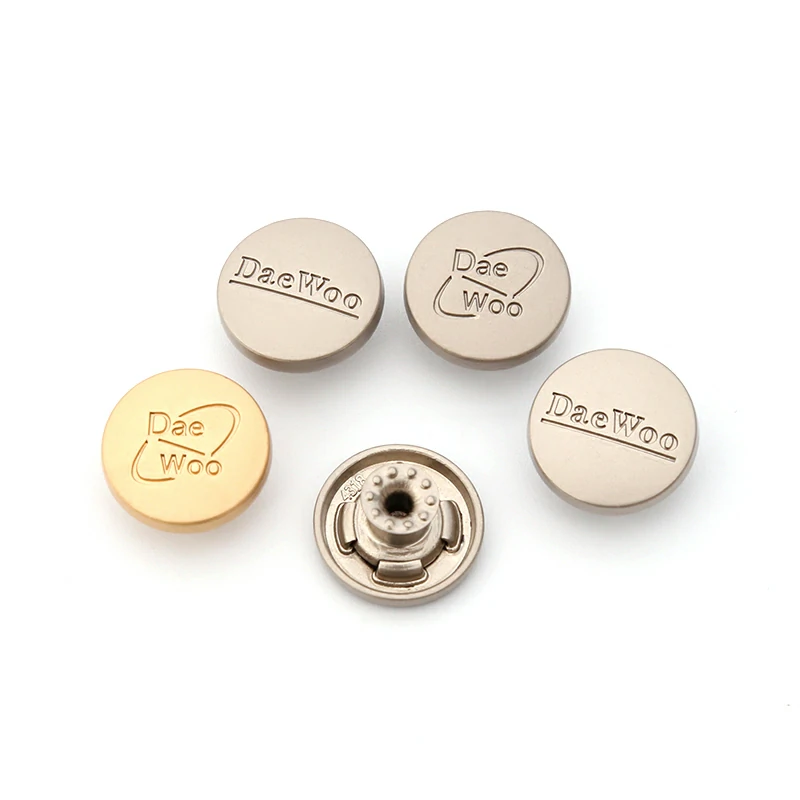Metal buttons for jeans play a significant role in enhancing the durability and longevity of the garment in the following ways:
Secure Closure: Metal buttons provide a secure closure for jeans, ensuring that the waistband and fly remain fastened. This prevents accidental openings or the need for constant readjustment, contributing to the overall durability and functionality of the garment.
Strength and Resistance: Metal buttons are typically made from sturdy materials such as brass, zinc alloy, or stainless steel. These metals offer strength and resistance to wear and tear, allowing the buttons to withstand regular use and repeated fastening and unfastening without easily breaking or deforming.
Enhanced Fastening: Metal buttons often feature a shank or a loop on the backside, which provides additional reinforcement when attaching them to the fabric. This secure attachment helps prevent buttons from pulling through the fabric or becoming loose, increasing the longevity of the garment.
Durability in Washing: Metal buttons are generally resistant to the harsh conditions of machine washing and drying. They can withstand exposure to water, detergents, and high temperatures without corroding or deteriorating. This durability ensures that the buttons remain intact, maintaining the functionality of the jeans even after multiple wash cycles.
Abrasion Resistance: Metal buttons are less prone to abrasion compared to buttons made of plastic or other materials. The smooth and solid surface of metal buttons minimizes friction and rubbing against the fabric, reducing the risk of wear and tear or surface damage over time.
Timeless Aesthetics: Metal buttons for jeans often have a classic and timeless appearance that can complement various denim styles and endure changing fashion trends. metal button for jeans Their enduring aesthetic appeal reduces the likelihood of needing to replace buttons due to style obsolescence, further extending the lifespan of the jeans.
Repair and Replacement: In the event that a button becomes damaged or needs replacement, metal buttons are generally easier to repair or replace compared to buttons made of other materials. They can be removed and reattached without causing significant damage to the fabric, facilitating button replacement and prolonging the usability of the garment.
By providing secure closure, strength, resistance to wear and tear, durability in washing, and timeless aesthetics, metal buttons for jeans contribute to the overall durability and longevity of the garment. They are designed to withstand the demands of everyday use and maintain their functionality and appearance over an extended period, ensuring that jeans can be enjoyed for a longer period before needing repairs or replacements.
What types of metals are commonly used in the production of metal buttons for jeans?
Several types of metals are commonly used in the production of metal buttons for jeans. The choice of metal depends on factors such as durability, aesthetics, and cost.
Here are some of the commonly used metals:
Brass: Brass is a popular choice for metal buttons due to its durability, corrosion resistance, and malleability. It has a warm, golden hue that adds a classic and stylish look to jeans.
Zinc Alloy: Zinc alloy, often referred to as Zamak, is another commonly used metal in button production. It is a versatile material that can be easily molded into various shapes and designs. Zinc alloy buttons are known for their strength, lightweight nature, and affordability.
Stainless Steel: Stainless steel buttons are highly durable and resistant to corrosion, making them suitable for jeans that undergo frequent washing or exposure to moisture. They have a sleek and modern appearance.
Aluminum: Aluminum buttons are lightweight and corrosion-resistant. They are often used in jeans where weight reduction is desired, such as in lightweight or stretch denim. metal button for jeans Aluminum buttons can be anodized to achieve different colors.
Copper: Copper buttons offer a distinctive reddish-brown tone and are known for their excellent conductivity and antimicrobial properties. They are less commonly used in button production but can add a unique touch to denim garments.
Nickel: Nickel is sometimes used as a base metal for plating buttons. Nickel-plated buttons provide a shiny and polished appearance. However, due to concerns regarding nickel allergies, nickel-free alternatives are becoming more prevalent in the market.
Pewter: Pewter is a soft and versatile metal alloy that can be easily shaped and engraved. Pewter buttons often have an antique or rustic appearance, adding a vintage charm to jeans.
It’s worth noting that some metal buttons may undergo additional treatments or finishes, such as electroplating or painting, to enhance their appearance or provide specific colors or textures.
The choice of metal for jeans buttons depends on factors such as design preferences, desired aesthetics, durability requirements, and budget considerations. Each metal offers its own unique characteristics and contributes to the overall look and functionality of the buttons on jeans.
